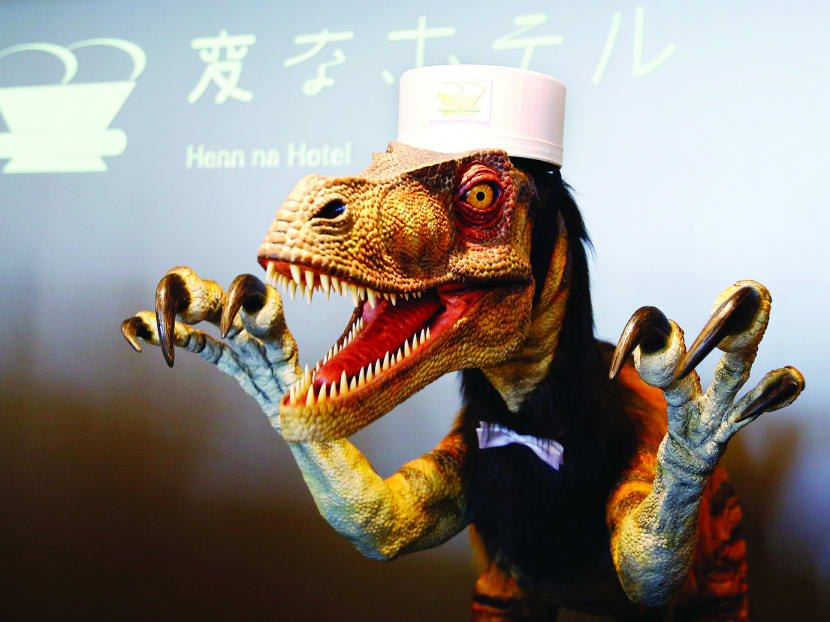Japan hotel’s robots at your service
SASEBO (Japan) — The English-speaking receptionist is a vicious-looking dinosaur, while the one speaking Japanese is a female humanoid with blinking lashes. “If you want to check in, push 1,”says the dinosaur. A visitor still has to punch a button on the desk and type in information on a touch-panel screen.

The front-desk dinosaur robot at Henn na Hotel in Sasebo, south-western Japan, which uses technology to highlight innovation and save manpower costs . Photo: AP
SASEBO (Japan) — The English-speaking receptionist is a vicious-looking dinosaur, while the one speaking Japanese is a female humanoid with blinking lashes. “If you want to check in, push 1,”says the dinosaur. A visitor still has to punch a button on the desk and type in information on a touch-panel screen.
From the front desk to the porter, which is an automated trolley taking luggage to the room, this hotel in south-western Japan, aptly called Weird Hotel, is “manned” almost completely by robots to save labour costs.
Mr Hideo Sawada, who runs the hotel as part of an amusement park, insists that using robots is not a gimmick, but a serious effort to utilise technology and achieve efficiency.
Henn na Hotel, as it is called in Japanese, was shown to reporters on Wednesday, complete with robot demonstrations, ahead of its opening to the public today.
The hotel also uses facial-recognition technology, instead of standard electronic keys, by registering the digital image of a guest’s face during check-in.
The reason? Robots are not good at looking for keys, if people happen to lose them.
A giant robotic arm, usually seen in manufacturing, is encased in glass quarters in the corner of the lobby. It lifts one of the boxes stacked into the wall and puts it out through a space in the glass, where a guest can place an item in it, to be used as a locker.
The arm will put the box back into the wall, until the guest wants it again. The system is called the “robot cloak room”.
Why a simple coin locker will not do is not the point. “I wanted to highlight innovation,” Mr Sawada tells the reporters. “I also wanted to do something about hotel prices going up.”
Staying at Henn na Hotel starts at ¥9,000 (S$99), a bargain in Japan, where a stay at one of the nicer hotels can easily cost twice or thrice the amount.
The concierge is a doll-like hairless robot with voice recognition that prattles breakfast and event information. It cannot call a taxi or do other errands.
Japan is a world leader in robotics technology and the government is trumpeting robotics as a pillar of its growth strategy. Robots have long been used in the nation’s manufacturing sector.
However, there is much interest in exploring the potential of robots in human interaction, including helping to care for the elderly.
Robotics was also key in the decommissioning of the three reactors in Fukushima, which went into meltdowns in 2011 in the worst nuclear catastrophe since Chernobyl.
An area Henn na Hotel still relies on human beings is security. The place is dotted with security cameras and real people are watching everything on a monitor to ensure guests stay safe and no one makes off with one of the expensive robots.
“And they still can’t make beds,” says Mr Sawada, who has also engineered the rise of a popular and affordable Japanese travel agency.
He has big ambitions for his robot-hotel concept and wants to open another one soon in Japan and later abroad. He is also eager to add other languages, such as Chinese and Korean, to the robots’ vocabulary.
A block-shaped robot that is scuttling around in the lobby has been brought in to do room service, such as delivering beverages and snacks. But it is not ready to do that yet.
Outdoors, Mr Sawada also demonstrates how to use a drone that can fly in to deliver jars filled with snacks. He says he wants to eventually have drones perform in shows for guests.
In the hotel’s rooms, a lamp-size robot in the shape of a fat pink tulip called Tuly answers simple questions such as “What time is it?” and “What is the weather tomorrow?”.
You can also tell it to turn the room lights on or off. There are no switches on the walls.
Mr Sawada is keeping the hotel half-filled for the first few weeks to make sure nothing goes wrong.
He has also cancelled the overnight stay planned for the media. The robots simply are not ready. AP





